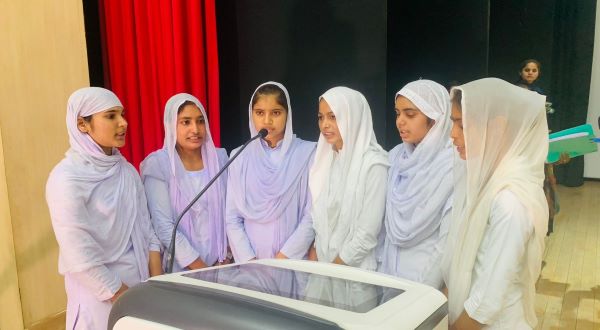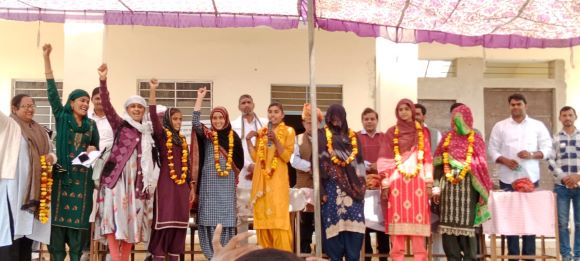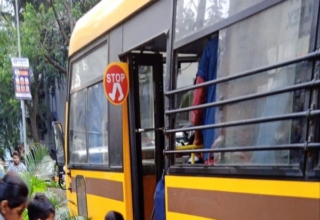
Alwar’s Mewat region in Rajasthan bordering Haryana at a distance of 80 Km from Delhi, a known pocket of poverty and backwardness in the country, of late was in news for cyber financial frauds taught and executed in an organized manner. While it may have brought more notoriety to the area and brought a welcome focus on dropouts and out of school/college youth, there is a lot to this region that the country must be proud of and talking about. Alwar Mewat Institute of Education and Development (AMIED, esb 2000), an education focused, nonprofit, having supported 15000 girls get educated so far is successfully effecting a profound change in the society over girl education. And in doing so, is also building reliable handholding models for emancipation of woman power including stopping child marriages through schooling. On the 15th anniversary of RTE Act, Autar Nehru spoke with Noor Mohammad, founder member and executive director of Alwar Mewat Institute of Education and Development (AMIED) on this positive story:
How did you get into education promotion and why focus on girl education?
After my postgraduation, I got placed in a project on sahariya tribes in Shahbad tehsil of Baran district. Working there for 12 years, I realized that the condition of female literacy in my home district of Alwar among mewatis was worse than tribal girls, I was working for. My long experience in the project also added to my confidence of starting some similar work in our area. So, some of us likeminded people got together and set up this NGO in 2000. We started in Mirzapur village in Kishangarh block.
As regards, why we chose girl education, was because in our surveys we found the female literacy rate in most of the villages was below 10% and, in some places, even zero. So, this was an area, which we thought needed attention, more so because of the widespread orthodoxy and cultural taboos among meos (Mewat Muslims).
Tell us about your initial journey and how you gathered more momentum to launch interventions which got noticed globally?
In the first few years, our focus was on primary schooling; enrolment and education quality being the objectives. We would prompt, incentivize and even in places brought girl students from other villages to motivate people to send girls to schools. We found ways to engage community and make them aware on the benefits of education and also what government programs were available for the benefit of girl students.
Then, we also got into addressing infrastructure issues like lack of toilets, a demotivating factor for girl students. We adopted 25 government schools after CSR legislation was passed by the Government. Using CSR funding, we addressed the issue of lack of toilets, library, boundary walls, purchased desks to make girls to look comfortably at black boards (earlier sitting they would complain of stiff necks). Then while setting up computer labs, we were also faced with power cuts, so we also installed solar panels. In some schools we helped in creating sports, smart classes and other infra needs. Parallelly we also did teacher training and a holistic sexual and reproductive health education program in a lifeskills program for adolescent girls.
You were also telling about a school built through active support of villagers in Jatpur of Ramgarh. Please elaborate on this welcome example.
Yes, like other schools, we started infrastructure improvement in the school in 2016. The villagers formed a committee among themselves and resolved to help. They first leveled the field, which was in a really bad shape with large pits and uneven surfaces. Next, they build the boundary wall with their own money. They would also volunteer to work. To raise the funds, the villagers had decided to keep a separate donation stall/box at every function from marriages to anniversaries. Then, people also donated in memory of their deceased family members. By 2022, when our work was completed to fully develop village senior secondary school, we had spent around Rs 25 lakh under CSR but the villagers had spent more than Rs 45 lakh. I think, if that is the spirit, we can really reduce dependency for funds on government and other agencies to improve infra in schools.
That’s really a shining example. Now tell us about the important intervention of keeping girls in schools’ post-primary classes by helping them pass class 10?
That’s also an innovation by us. While we were addressing the apparent reasons like lack of infra, we also came across a big reason for students dropping out. It was lack of basic literacy and numeracy as they struggled to read and comprehend or do simple arithmetic as they reached class 9. Even after several attempts most of the girls couldn’t pass the board exams. That was becoming a bigger psychological barrier not only among the students but even among the community. So, we launched a special programme, wherein we examined and earmarked the easy portions of Rajasthan School Board syllabus. In collaboration with school heads, employing tutors, we started remedial classes in English, Maths and Science within schools and helped them prepare for exams. In order to pass the examination, student is required to score a minimum of 40%, so we identified how to secure this minimum. Starting with the easy chapters, our tutors work on them and students themselves feel confident and motivated. And this worked. And continues to be an important program for us.
Very Good. So, this is an intervention for those who are still in schools, but what about a large number of dropouts?
We have 40 centres (Kishori Balika Kendra) for them across the region (Alwar and Karauli). And our work is divided among till class 8 and beyond class 8. For those who have dropped in 8th or below, we offer remedial classes to make them school appropriate and then admit them back to the class in a government school. For those we have left after class 8, we again run special classes and then get into open schooling for their secondary education.
Then what about scholarship program?
We encourage girls at every step and have scholarships as incentives for technical and higher education. Depending on the course, we provide upto Rs 15000 assistance to girls in our goal of helping young women study beyond secondary school education stage. As soon as board results of class 12 are declared we collect data from schools and then motivate them for seeking admission in colleges through an awareness campaign and scholarships. We believe once they get of their homes, they will get expose, their vision will broaden and importantly will realize their potential.
Tell us briefly about your coaching initiative?
Last year in 2023, we launched this online coaching initiative for state public service commission and UPSC exams, CA, Teacher training, NET and Delhi Police. We buy the relevant courses and give to these girls. While it is a self-learning course, we organize periodic meetings to review the progress and also through peer interaction and other discussion also create a community of these candidates. We are hoping this will give us some success of creating role models.
Role Models, can you elaborate on this?
Actually, having role models is a necessary factor in communities and groups. So, our objective is to handhold and support these young women, so that they can realize their dreams and actually get into real world roles and jobs. The next generation of girls will see a role model in them and strive to move forward in life by educating themselves.
You have lauded the Rajasthan government’s scheme of making senior school heads as panchayat education officers. How is that?
This intervention has is very good and I can tell you from own experience, it has been a great change on ground for people like us. In this the cluster of schools under the Panchayat are being headed by the principal of the senior secondary schools and monitored and helped. This has improved access of girl children to school for secondary education, speeded up work related processes, improved compliance, made management of lower school better. This has also helped arrest dropout rate of these students as a student who otherwise owing to difficulty in transport, teasing and other obstructions wouldn’t study, is coming to this school in every panchayat and most of them continue till class 12.
You also made notable strides bettering SMCs, it is true?
School Management Committee (SMC) is a powerful provision in the Right to Education law. The president has to be a parent while the head teacher will be its secretary. Since to head a SMC which includes approvals and signing papers, needs skills, often it happens that most parents of government schools in areas like ours are illiterate. So, they need capacity building, training and orientation. In the schools we did this, the SMCs became active and actually opened doors for community participation as community started taking school development in its hands. Parallelly, we also sanitized school teachers on power and authority structure in SMCs.
Any concluding thoughts?
Our working is chiefly through Community Mobilization, Capacity Building of Children, Strengthening of Govt. Schools, Working with Other Stakeholders, Networking and Advocacy. And if, we could provide evidence of this by our achievements, it will be an honor to vision of our organization to see more women in educational institutions.
Thank You.












